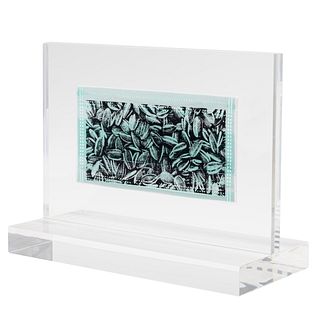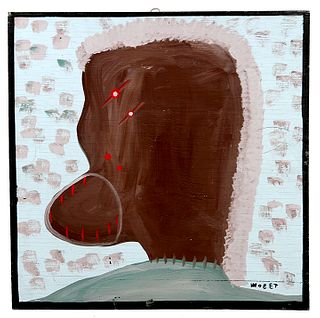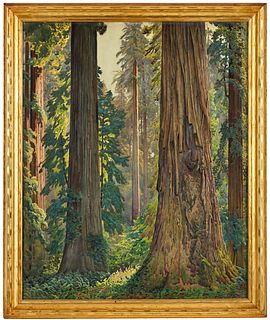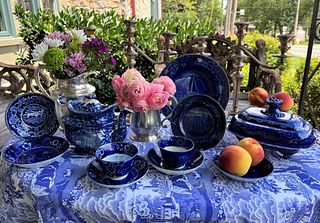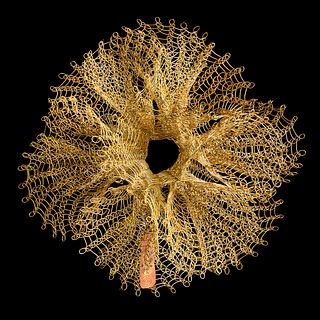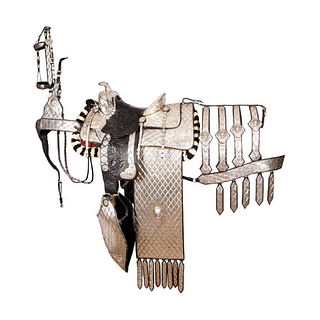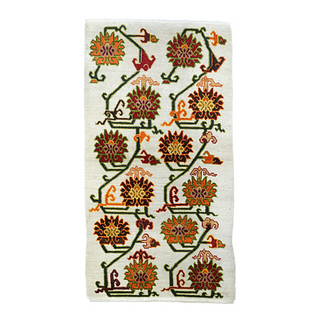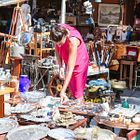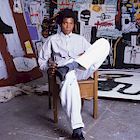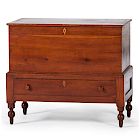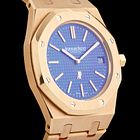Hector Hyppolite: Haitian Vodou and Surrealism
He claimed that La Sirene, The Goddess of the Sea, was his life-partner and for a third generation Vodou priest with an aptitude for painting, they would have undoubtedly made a wondrous pair. "He" is Hector Hyppolite, the mythical painter considered to be the spiritual father of the Haitian Art Movement. Hector Hyppolite was born in 1894 in Saint-Marc and began his early life continuing his family tradition as a Houngan (Vodou priest) who also, on occasion, made shoes and painted houses. However, it wasn't until Philippe Thoby-Marcelin, a Haitian poet and novelist, noticed Hector Hyppolite's painterly talents that Hyppolite's rather isolated life began to unfold into a noticeable career in the arts.
Lot 74, Hector Hyppolite, "Poisson A Tete De Femme", Oil painting on board; Estimate $20,000-$40,000
In 1946, Philippe Thoby-Marcelin brought Hyppolite to Haiti's capital Port-au-Prince where he worked in a studio run by Dewitt Peters, a watercolorist and schoolteacher from the United States. At Le Centre d’Art, an art center providing free materials, which still operates and is considered to be the cradle of Haitan art since 1944, Hector Hyppolite was able to replace his chicken feather brushes and cardboard canvases for finer tools to advance his prophetic painting portfolio.
Hyppolite's aesthetics reflected his regard for Laos, the Gods of Vodou, and the masterful visions brought to him by symbols found in Haitian culture as well as outside elements he picked up from his travels to Cuba and New York in the early 20th century. Although, he is said to have also spent time in Africa, there is no concrete documentation to back this claim, so it remains a fanciful rumor that nevertheless empowers his already mysterious disposition. A master of the flat, folkloric style seen in the peasant art of rural peoples the world-over, Hyppolite's potent strokes attracted brilliant minds such as André Breton, the French writer, poet and art theorist.
Lot 75, Hector Hyppolite, "Erzulie", Oil painting on cardboard; Estimate $20,000-$40,000
During a trip to Haiti in 1945, the principal authority of Surrealism, André Breton, and artist Wifredo Lam, purchased several paintings by Hyppolite. Breton, upon discovering Hyppolite's imaginative works, tied them directly to his already established surrealist theories. His intense reaction to them can be found in a comment that Breton left in the visitors book at the Centre d’Art in Port-au-Prince: “Haitian painting will drink the blood of the phoenix. And, with the epaulets of [Jean-Jacques] Dessalines, it will ventilate the world.” Returning to France with multiple paintings by Hyppolite, Breton integrated this artwork into his writings and sharpened his focus on the occult, myth and magic present in surrealist methods. Hyppolite's work was a major inspiration for the exhibtion Le Surréalisme En 1947. One of his paintings, "La Reine Congo" (1946) remains in the permanent collection of the Museum of Modern Art.
During the height of his popularity, Hector Hyppolite unfortunately suffered a fatal heart attack at the age of 54. In just three short years he produced hundreds of works, of which nearly half are known to survive. With their rarity in mind, Bidsquare is excited to have three exceptional works by Hector Hyppolite coming up during Material Culture's, Art 360 | Fine, Folk, Outsider & Ethnographic Art sale on May 5th.
Hector Hyppolite's work expanded Haitian painting to a wider audience and impacted some of the most highly regarded intellectuals of the 20th century - the American novelist Truman Capote, best known for his true crime novel In Cold Blood, praised Hyppolite's painting "because there's nothing in it that has been slyly transposed". In many ways, it's exactly Hyppolite's brutal honesty that both intimidates and entices you to keep looking.
Don't have a Bidsquare account? Sign up here!
Be in the know about upcoming auctions and exciting post-sale results by following us on Facebook and Instagram.

Jessica Helen Weinberg | Senior Content Editor at Bidsquare
- Quilts as a 2025 Design Trend: A Celebration of American Heritage and Craftsmanship
- A Celebration of Sports History and Collectibles
- The Thrill of Sports Memorabilia Auctions: A Collector’s Paradise
- Demystifying Coin Condition: A Guide to the Sheldon Grading Scale
- Snoopy & Friends: A “Peanuts” Auction at Revere
- Colorful Chinese Monochromes at Millea Bros
- 12 Holiday Gifts for the “Impossible to Buy For” on Bidsquare
- Alluring Art Objects and Accessories from the Estate of Chara Schreyer
- Kimball Sterling's One-Owner Outsider and Folk Art Collection Showcases Masters of the Unconventional
- The Moke Mokotoff Collection of Asian Art at Stair



 EUR
EUR CAD
CAD AUD
AUD GBP
GBP MXN
MXN HKD
HKD CNY
CNY MYR
MYR SEK
SEK SGD
SGD CHF
CHF THB
THB
.jpg)
.jpg)

